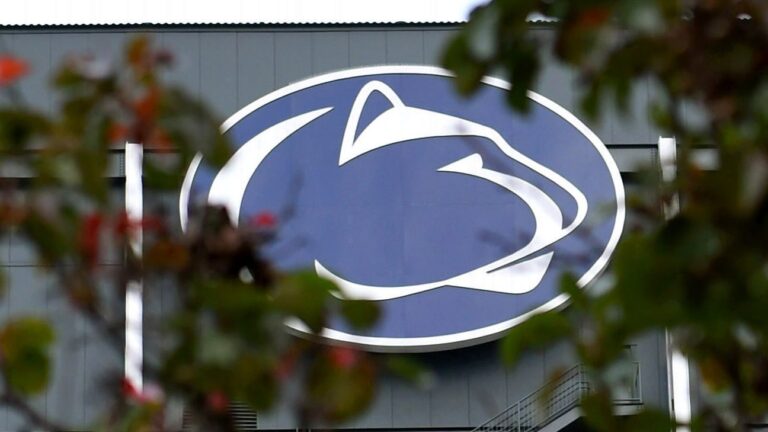A jury is scheduled Monday to hear claims that Pennsylvania officials fired a team doctor who accused football coach James Franklin of interfering with players' medical care and endangering their health and safety.
Orthopedic surgeon Dr. Scott Lynch filed the lawsuit in August 2019, about six months after he was fired from his position as orthopedic surgeon and director of athletic medicine for Penn State's football team, a position he had held since 2014. .
Lynch said the exclusion was in retaliation for complaints against Franklin. According to the amended complaint filed in 2021, coach James Franklin “repeatedly attempted to interfere with Plaintiff's autonomous authority to make medical management and return-to-play decisions regarding student-athletes.”
“A medical professional's duty is to the patient, not to help the coach win games or keep his job,” Lynch told ESPN. “It is wrong and should not be tolerated for coaches to try to fit themselves into the patient risk-benefit equation. We need independent oversight of medical care.”
“I hope my lawsuit will be a catalyst for the rest of the country.”
Officials at Penn State and its Milton S. Hershey Medical Center, where Lynch still works as an orthopedic surgeon and sports medicine director, denied the retaliation claims. Lynch, who commuted from his home about 100 miles away in Hershey, Pennsylvania, was laid off so the school could hire doctors who lived in the state university community, officials said.
A Penn State spokesperson did not address the allegations regarding Franklin's conduct, but said in a statement emailed to ESPN on Friday, “The health, safety, and wellness of our student-athletes is the responsibility of the university and Coach Franklin.” “This is a top priority for Penn State, and one that Penn State is proud of.” Many experts from Penn State athletics and across the university were dedicated to these substantial efforts. ”
Lynch's attorney, Steve Marino, said he would not call Franklin or the athletes to testify, but instead would rely on testimony from other sports medicine officials. Former Big Ten commissioner Jim Delaney is also on the list of potential witnesses.
In previous interviews, Mr. Marino and Mr. Lynch declined to give examples of obstruction by Franklin, but said they were likely to emerge at trial.
The lawsuit mentions Franklin and Penn State University, but both were dismissed as defendants in 2020. Mr. Lynch is suing Penn State Medical Center Milton S. Hershey Medical Center and his supervisor, Dr. Kevin Black, who announced his termination. The complaint alleges that Lynch reported Franklin's “misconduct and violations” to Black, then-sports integrity officer Robert Borland and then-athletic director Sandy Barber.
It alleges that on or about January 24, 2019, Barber and assistant athletic director Sharmell Green “conveyed a request” to Black to fire Lynch, and less than two weeks later, Black announced that Lynch He announced that he would be replaced as of April 1st.
In a statement released after Lynch's lawsuit was filed, the Penn State Department of Health said the move to a new team physician was made “in light of the increasing complexity and demands of sports medicine, and with the best interests of our student-athletes in mind.” I put it there and it was done.” As for healthcare in general. ” Lynch denied the allegations, but thanked him for his continued relationship with the medical center.
In an email to ESPN, Lynch criticized universities and the NCAA for not doing enough to protect medical staff. “Their objectivity is compromised because they are investing so much money,” he says.
In 2019, the NCAA Division I Board of Governors passed legislation that guarantees sports health care providers have “uncontested” authority when making decisions regarding an athlete's medical and return to play, and requires each school to It mandated the appointment of a sports health care manager to promote health management. . An NCAA spokeswoman said she could not gather information on what the NCAA has done since then regarding independent medical care or whether it knows how many schools are in compliance.
Kathy Dieringer, president of the National Athletic Trainers Association, said that while its members work with and sometimes report to team physicians, the NCAA's medical autonomy document requires athletic trainers to be independent. He said it supports his decision-making claims. She added that the pandemic has “made things better” for sports medicine professionals. Because they often took the lead in enforcing COVID-19 protocols and keeping students safe, they earned more respect and recognition. But she said she could not speak to what the NCAA is doing regarding enforcement or how often athletic trainers still deal with coaches who try to intervene.
“Is it as nice as it can be?” she said. “As with everything, I think there are exceptions.”
It is unusual for this issue to be heard in court. Dearinger said he was not aware of any other similar cases. Although she could not comment directly on the case, she said it “certainly highlights the importance of autonomy in medical decision-making.”

